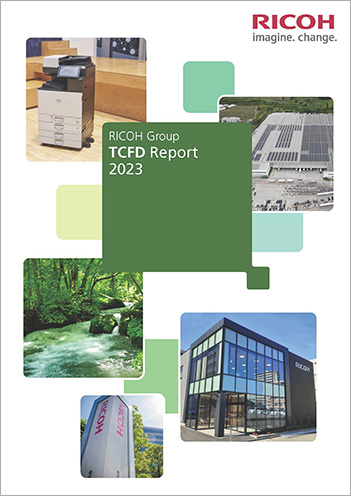TCFD Report

Reports in line with TCFD framework
In line with the TCFD framework, we report on the Ricoh Group's efforts toward a zero-carbon society in our Environmental Report.
Ricoh Group Environmental Report 2024 (60P/8MB)
Back Number
Ricoh Group TCFD Report 2023(36P/6.69MB)
Ricoh Group TCFD Report 2022(36P/6.30MB)
Ricoh Group TCFD Report 2021(36P/8.35MB)
Climate Change Strategy at the Ricoh Group

“Climate change” is one of the most important social issues facing the global community. The world is becoming more and more aware of the “Climate Crisis”. The Paris Agreement, an international agreement to combat climate change, aims to “pursue efforts to keep the global average temperature increase well below 2 degrees Celsius above pre-industrial levels and to limit it to 1.5 degrees Celsius,” which requires achieving a balance between anthropogenic greenhouse gas emissions and absorption in the second half of this century.
In addition, in August 2021, the IPCC (United Nations Intergovernmental Panel on Climate Change) announced its prediction that the global average temperature rise will reach 1.5 degrees Celsius above pre-industrial levels between 2021 and 2040. Countries and companies around the world will need to further strengthen their efforts to tackle climate change.
The Ricoh Group has been working on environmental sustainability management for many years, but we are already experiencing more frequent and severe abnormal weather events on a global scale than expected, and we are strengthening our efforts to achieve a decarbonized society. Therefore, we have conducted detailed impact assessments of our global production sites, and we have established a response plan that anticipates future risks at the end of FY2020, and have begun implementing countermeasures. In addition, the introduction of a carbon tax with the early transition to a decarbonized society and rapid changes in the behavior of consumers and investors have increased the urgency of our response. In response to this, we have revised our environmental targets for 2030 and raised our target for the ratio of renewable energy to electricity used in our business from 30% to 50%.
On the other hand, proactive responses to climate change mitigation and adaptation will provide opportunities for our business to offer products and solutions that support customers' decarbonization by utilizing energy and resource saving technologies and services. In addition, solutions to combat infectious diseases will provide new value for the new normal way of working, and business expansion and the creation of new businesses in the environmental and energy fields have been reconfirmed as having great potential to generate future financial benefits.
The Ricoh Group conducts an annual review of the business impact of climate change in line with the TCFD framework, and regularly reviews the results to identify the latest climate change risks and opportunities, and to promote decarbonization activities. Through disclosure in line with the TCFD framework, we will continue to deepen the exchange of opinions with our stakeholders and improve our initiatives and disclosure on climate change.
Referenced Published Scenarios
| 1.5℃scenario | 4℃ Scenario |
|---|---|
| IEA NZE 2050 RCP2.6 |
IEA STEPS RCP8.5 |
Types of climate-related risk included in risk assessment
Current Regulation
Emerging Regulation
Technology Risk
Legal Risk
Market Risk
Reputational Risk
Acute Physical Risk
Chronic Physical Risk